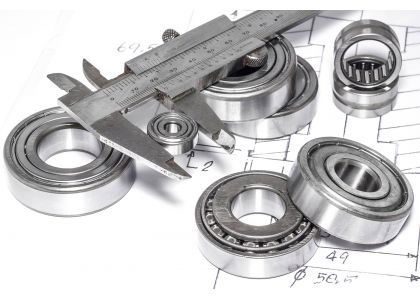INDUSTRY NEWS
Precision Bearings: Enabling Precision and Efficiency in Engineering Applications

Introduction:
Precision bearings play a crucial role in a wide range of engineering applications where accuracy, reliability, and efficiency are paramount. This article delves into the significance, types, advancements, and applications of precision bearings.
Importance of Precision Bearings:
Precision bearings are designed to provide exceptional accuracy, smoothness, and stability, allowing for precise rotation or linear movement. These bearings find applications in industries such as aerospace, automotive, robotics, medical equipment, and high-speed man ufacturing. They ensure precise alignment, reduce friction, and enable efficient power transmission, ultimately contributing to the overall performance and quality of diverse engineering systems.
Types of Precision Bearings:
Deep Groove Ball Bearings:
Deep groove ball bearings are widely used due to their versatility and radial load-carrying capability. They accommodate high rotational speeds and are commonly employed in electric motors, machine tools, and gearboxes.
Angular Contact Ball Bearings:
Angular contact ball bearings can handle both radial and axial loads. They are specifically designed to support combined loads and are commonly used in machine tool spindles, automotive wheels, and aircraft landing gear.
Cylindrical Roller Bearings:
Cylindrical roller bearings offer high radial load capacity and are suitable for applications with moderate to high speeds. These bearings are commonly utilized in motors, pumps, and industrial gearboxes.
Tapered Roller Bearings:
Tapered roller bearings can handle both radial and axial loads and are designed to accommodate high thrust loads efficiently. They are commonly used in automotive transmissions, railway systems, and heavy machinery.
Advancements in Precision Bearings:
Ceramic Bearings:
Ceramic bearings, made from materials such as silicon nitride or zirconia, offer superior strength, reduced weight, and enhanced corrosion resistance compared to conventional steel bearings. Their high-performance characteristics make them suitable for demanding applications , including high-speed spindle systems.
Hybrid Bearings:
Hybrid bearings combine traditional steel rings with ceramic rolling elements. This combination enhances the bearing’s performance by reducing friction, enhancing speed capabilities, and extending the operating life. Hybrid bearings find applications in precision machinery , electric motors, and medical equipment.
Miniature Bearings:
With the rise of miniaturized technologies, miniature bearings have become essential components in micro-electromechanical systems (MEMS), robotics, and medical devices. These bearings provide ultra-precision and reliability in compact designs.
Applications of Precision Bearings:
Aerospace and Defense:
Precision bearings are crucial for aircraft engines, missile guidance systems, avionics, and satellite systems. They ensure accurate control, smooth operation, and reliable performance in extreme conditions.
Medical Equipment:
Precision bearings are vital in medical equipment such as imaging systems, surgical tools, and laboratory instruments. They offer precise motion control, low noise operation, and long-term reliability.
Robotics and Automation:
Precision bearings enable precise positioning, smooth motion, and stability in robotics and automation systems. They are integral in industrial robots, collaborative robots, and automated manufacturing processes.
Conclusion:
Precision bearings are integral to various engineering applications, delivering accuracy, stability, and efficiency. With advancements in materials and design techniques, precision bearings continue to evolve, enabling higher speeds, increased reliability, and enhanced performance. As industries push the boundaries of technology, precision bearings will play a pivotal role in meeting the growing demands of precision engineering applications.